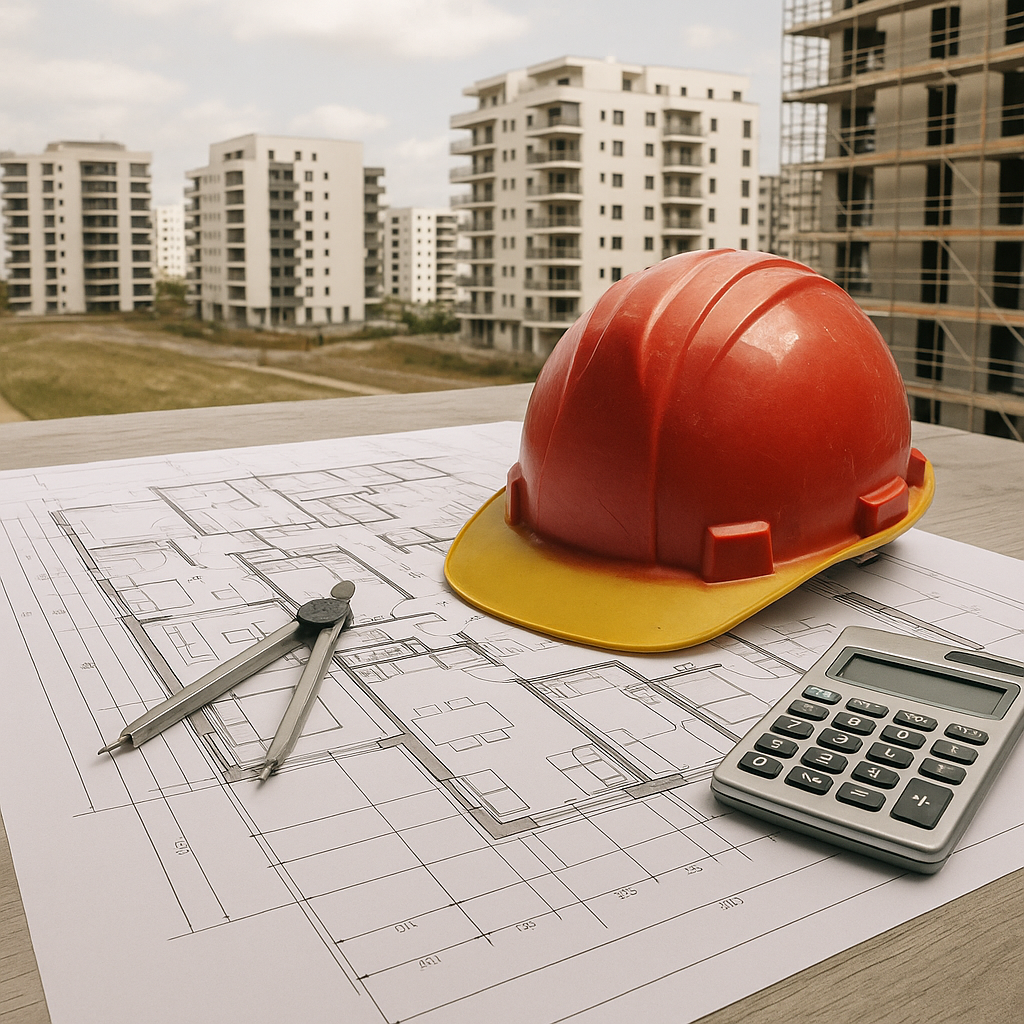Introduction
Purchasing a property off-plan in Israel can be both exciting and daunting. While you gain the potential for appreciation before the property is even built, you’re also committing to a significant investment based largely on blueprints and promises. Understanding Israel’s building standards is crucial for making informed decisions and setting realistic expectations for your future home or investment property.
Israeli Building Code and Regulation
Israel maintains a comprehensive building code known as “Teken Yisraeli” (Israeli Standard), which regulates construction quality and safety. The Israel Standards Institute (ISI) oversees these standards, which are continuously updated to incorporate modern building practices and technologies.
Key regulatory bodies include:
- Ministry of Construction and Housing: Sets overall policy direction
- Local Planning Committees: Approve building permits and enforce zoning laws
- Israel Land Authority: Manages state-owned land (around 93% of Israel’s territory)
- Israel Standards Institute: Defines technical specifications and quality standards
Each municipality may have additional requirements or interpretations of national standards, so building specifications can vary somewhat between Tel Aviv, Jerusalem, Haifa, and other localities.
Construction Quality and Materials
Israeli construction typically employs reinforced concrete as the primary building material. This choice reflects both local availability and the need for structures resistant to seismic activity. Modern developments increasingly incorporate steel reinforcement techniques and advanced concrete formulations.
The standard construction method involves:
- Reinforced concrete skeleton (columns and beams)
- Concrete block walls (either solid or hollow depending on structural requirements)
- External thermal insulation (becoming more common in newer buildings)
- Interior walls typically made from gypsum blocks or drywall in newer constructions
Quality control is mandated at various construction stages, with engineers required to certify structural elements. However, the level of finish detail can vary significantly between developers and price points.
Thermal and Sound Insulation
Israel’s Mediterranean climate, characterized by hot summers and mild, rainy winters, presents unique challenges for building design. Modern building standards require:
- Minimum thermal insulation requirements (R-values) for walls, roofs, and floors
- Double-glazed windows in newer constructions
- Proper sealing around windows and doors
Sound insulation between apartments has historically been a weakness in Israeli construction. While standards have improved in recent years, off-plan buyers should specifically inquire about:
- Floor thickness between apartments (minimum 20-25cm reinforced concrete is desirable)
- Sound insulation materials in shared walls
- Acoustic treatments around plumbing and mechanical systems
Electrical Standards and Systems
Israel operates on a 230V, 50Hz electrical system using Type H (specific to Israel) or Type C (European) plugs. Modern buildings include:
- 16-25 amp electrical service per apartment (higher in luxury developments)
- Circuit breakers and residual current devices (RCDs)
- Pre-wiring for communication systems (telephone, internet, cable TV)
- Smart home pre-wiring in higher-end developments
The Israeli electrical code (known as “Chok HaChashmal”) is strict regarding safety standards. All electrical installations must be certified by a licensed electrician upon completion.
Plumbing and Water Systems
Israel’s water conservation focus influences plumbing standards. Modern developments feature:
- Dual-flush toilets (mandated by regulation)
- Water-efficient fixtures
- Solar water heating systems (required by law since the 1980s)
- Water pressure boosting systems in taller buildings
- Separate water meters for individual apartments
Many new developments also include infrastructure for gray water recycling, reflecting the country’s emphasis on water conservation.
HVAC and Climate Control
Air conditioning is considered essential in most parts of Israel. New constructions typically include:
- Pre-installed air conditioning infrastructure (pipes, drainage, electrical connections)
- Split-system air conditioners (mini-splits) as the standard approach
- Underfloor heating in premium developments (especially in Jerusalem and elevated areas)
- VRF (Variable Refrigerant Flow) systems in luxury properties
Central air conditioning remains relatively rare in residential buildings but is becoming more common in high-end developments.
Earthquake Resistance Standards
Israel lies along the Syrian-African Rift, making seismic considerations important. Since 1980, Israeli Standard 413 has mandated earthquake-resistant construction techniques, including:
- Reinforced concrete structural elements
- Ductile connection details between structural components
- Foundation designs appropriate for soil conditions
- Structural analysis for seismic loads
Buildings constructed after 1995 generally incorporate more advanced seismic protection features than older structures.
Fire Safety Standards
Fire safety standards in Israel have been strengthened considerably in recent decades. Modern buildings must include:
- Fire-resistant construction materials
- Clearly marked emergency exits
- Sprinkler systems in common areas and increasingly within apartments
- Smoke detectors and fire alarms
- Fire-resistant doors for apartments and stairwells
High-rise buildings (above 8-13 floors, depending on the municipality) face additional requirements, including dedicated fire evacuation elevators and pressurized stairwells.
Common Areas and Facilities
Israeli residential buildings typically feature shared spaces with standardized requirements:
- Lobby areas with intercom systems
- Mailbox installations meeting postal service requirements
- Secure entrance doors with electronic access control
- Stairwells designed for emergency evacuation
- Elevator specifications based on building height and number of units
- Generator backup for critical systems in newer buildings
- Bicycle storage areas (increasingly common)
- Underground parking in newer urban developments
Premium developments may also include facilities like swimming pools, gyms, and communal roof terraces, though these are not standard features.
Energy Efficiency and Green Building Standards
Israel has been gradually implementing green building standards:
- The Israeli Green Building Standard (IS 5281) provides voluntary guidelines
- Energy ratings for new buildings becoming more common
- Solar water heating requirements
- Thermal insulation standards
- Water conservation requirements
While not all developments pursue formal green certification, many new projects incorporate sustainable elements as selling points.
The Specification Document (“Mifrat Techni”)
When purchasing off-plan in Israel, the technical specification document (“Mifrat Techni”) is your most important reference. This legally binding document details:
- Exact materials to be used
- Brands and models of fixtures and appliances
- Floor plans with precise measurements
- Electrical and plumbing layouts
- Finishes for walls, floors, and ceilings
- Allowances for buyer-selected items (kitchen, tiles, etc.)
Developers are legally obligated to deliver what’s specified in this document. Deviations may entitle buyers to compensation or remediation.
Common Variations from Plan to Reality
Despite regulatory oversight, certain discrepancies between plans and final construction are common:
- Minor measurement differences: Up to 2% variation in room dimensions is generally considered acceptable under Israeli law
- Substitution of equivalent materials: When specific brands become unavailable
- Changes to common areas: Often less luxurious than rendered in marketing materials
- Delivery timeline extensions: Construction delays are common and typically built into contracts
Being aware of these potential variations can help set realistic expectations.
Warranty and Building Inspection
Israeli law provides significant consumer protections for new construction:
- One-year warranty for general defects
- Three-year warranty for systems (plumbing, electrical, etc.)
- Seven-year warranty for structural elements
- Twenty-year warranty for load-bearing structural elements
Before taking possession, buyers have the right to hire an independent engineer (“bodek”) to inspect the property and document any deficiencies. This inspection is highly recommended as it establishes a baseline for future warranty claims.
Changes and Customization Options
Off-plan purchases typically allow for some customization, though the extent varies by developer:
- Standard changes: Selection from predetermined options for tiles, kitchen cabinets, bathroom fixtures, etc.
- Upgrade options: Paying additional fees for premium materials or fixtures
- Structural modifications: Generally limited to non-load-bearing walls and subject to engineering approval
- Electrical and plumbing adjustments: Possible within constraints if requested early in the construction process
Most developers set deadlines for customization requests, after which changes become either impossible or significantly more expensive.
Planning for Additional Costs
When purchasing off-plan in Israel, budget for these additional costs:
- Purchase tax (Mas Rechisha): Progressive tax based on property value
- Lawyer fees: Typically 1-2% of purchase price
- Registration fees: For transferring ownership in the land registry
- Connection fees: For electricity, water, and gas services
- Building maintenance fund (Keren Chidush): Initial contribution to building reserves
- VAT (Ma’am) at 17% (although foreign residents may be exempt under certain conditions)
- Post-handover modifications: Budget for inevitable adjustments to make the space truly yours
Conclusion
Israel’s building standards ensure a generally high level of construction quality, particularly for structural and safety elements. However, finish details and aesthetic elements can vary significantly between developers. When purchasing off-plan property in Israel, thorough due diligence on the developer’s reputation, careful review of the technical specification document, and ideally, consultation with an independent engineer can help ensure your expectations align with reality.
Understanding these standards and processes will empower you to make informed decisions and properly evaluate off-plan opportunities in Israel’s dynamic property market. While no purchase is without risk, knowledge of the regulatory framework and construction practices can significantly reduce uncertainty and lead to a more satisfying investment outcome.

